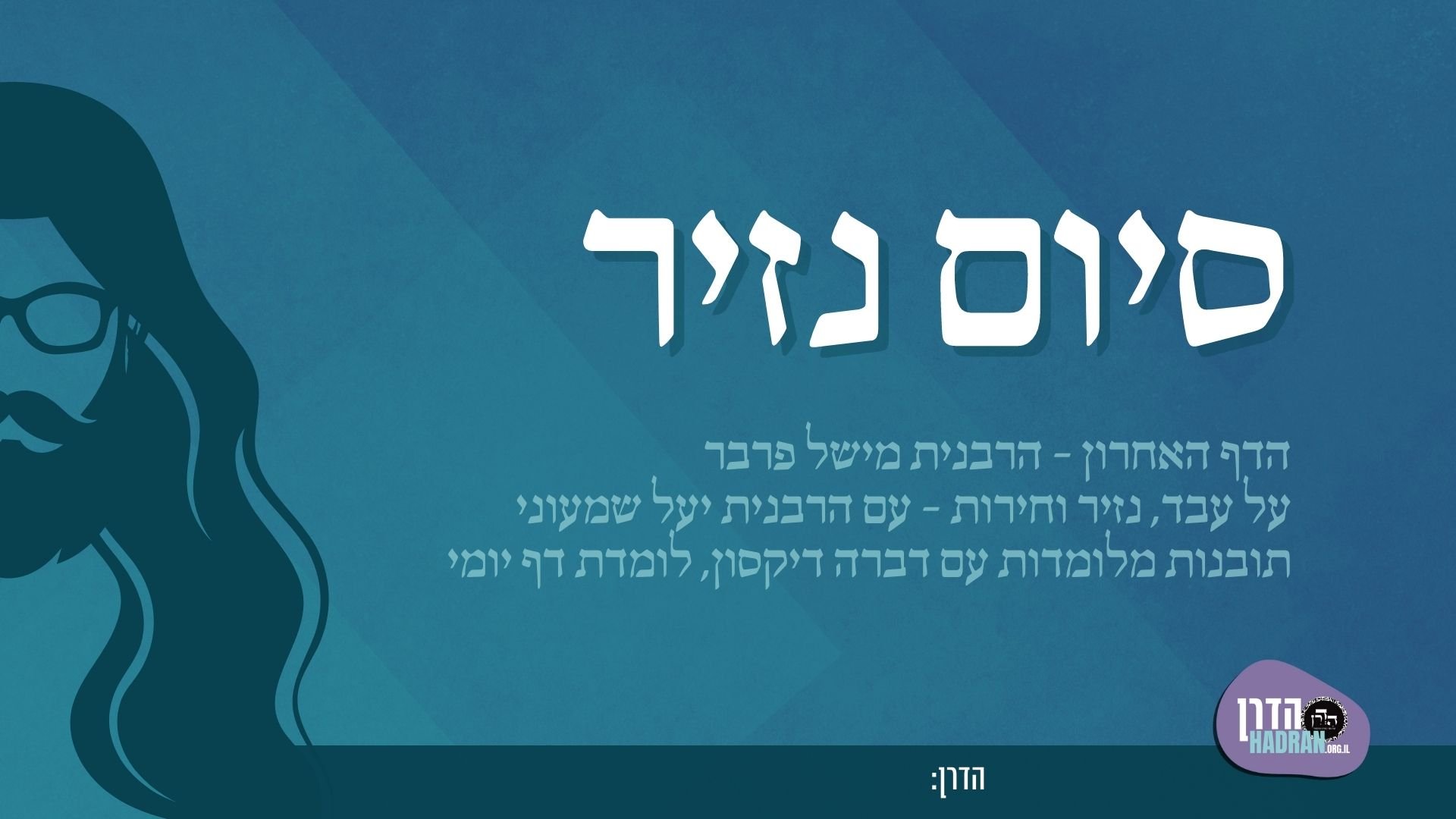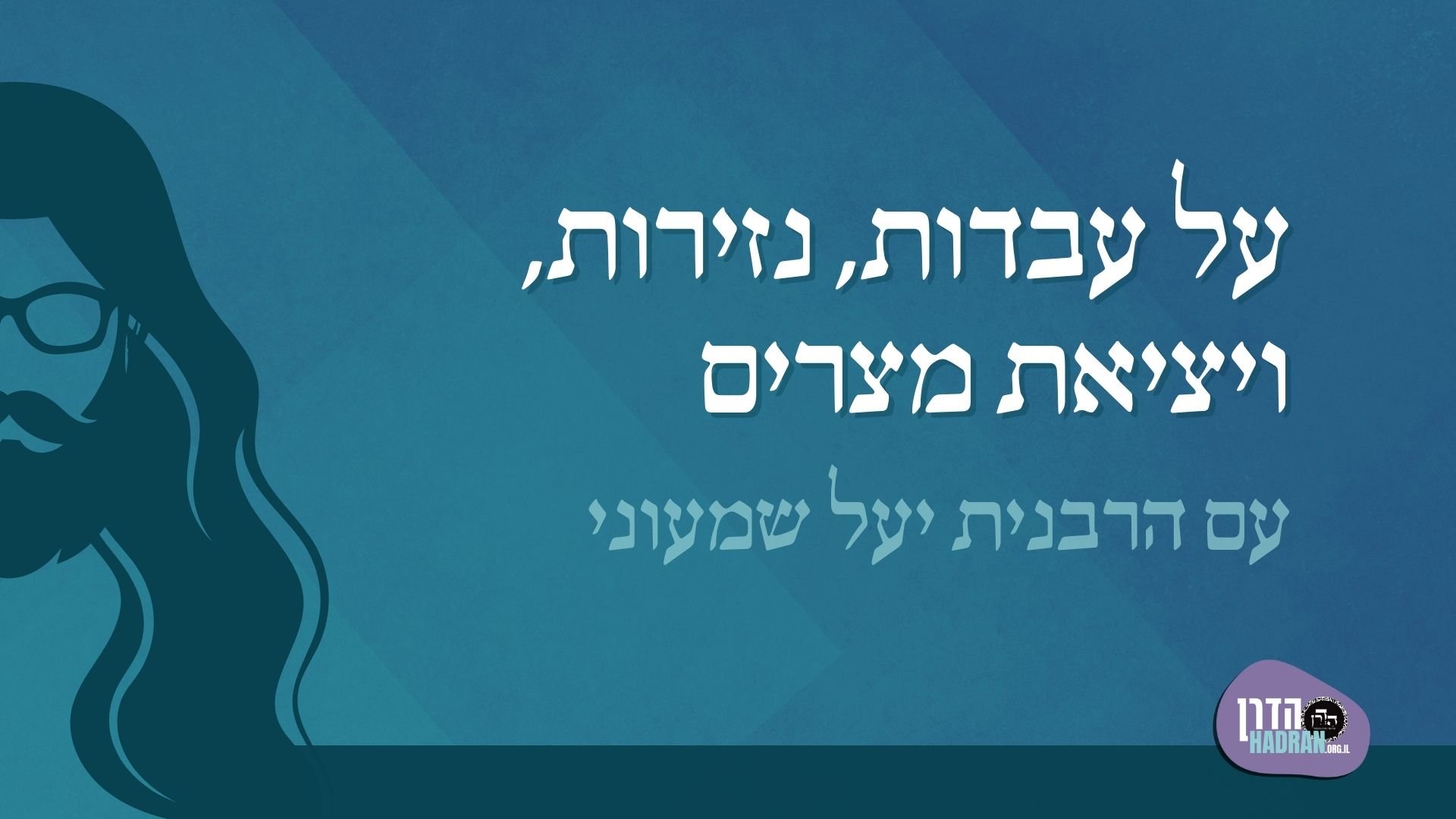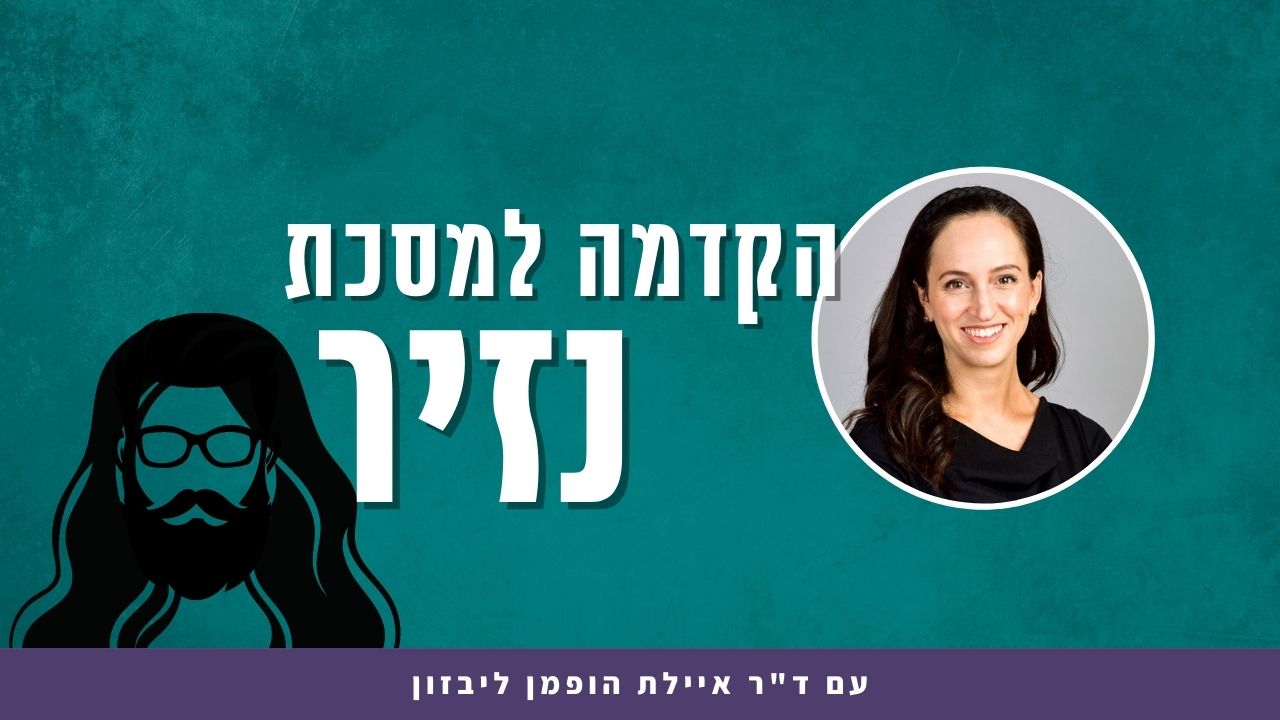נזיר מב
הָא ״גְּדִילִים תַּעֲשֶׂה לָּךְ״ מֵהֶם.
indicates that fringes in the mitzva stated in the adjacent verse: “You shall make for yourself fringes” (Deuteronomy 22:12), can be from them, wool and linen. By juxtaposing the mitzva of ritual fringes to the prohibition against diverse kinds of cloth, the Torah teaches that the positive mitzva of ritual fringes, which includes dyed blue wool, overrides the prohibition against diverse kinds of cloth, i.e., one may attach woolen ritual fringes to a linen garment. From here one derives the general principle that a positive mitzva overrides a prohibition.
אָמַר מָר: וְכוּלָּם שֶׁגִּילְּחוּ שֶׁלֹּא בְּתַעַר, אוֹ שֶׁשִּׁיְּירוּ שְׁתֵּי שְׂעָרוֹת — לֹא עָשׂוּ וְלֹא כְלוּם. אָמַר רַב אַחָא בְּרֵיהּ דְּרַב אִיקָא: זֹאת אוֹמֶרֶת, רוּבּוֹ כְּכוּלּוֹ מִדְּאוֹרָיְיתָא.
§ The Gemara returns to the mishna that teaches that nazirites, lepers, and Levites must shave their hair. The Master said above: And with regard to all of them, if they shaved with an implement other than a razor, or if they left two hairs uncut, they have done nothing. Rav Aḥa, son of Rav Ika, said: That is to say that the principle: The majority of an entity is considered like all of it, applies by Torah law.
מִמַּאי — מִדְּגַלִּי רַחֲמָנָא גַּבֵּי נָזִיר ״בְּיוֹם הַשְּׁבִיעִי יְגַלְּחֶנּוּ״ — הָכָא הוּא דְּעַד דְּאִיכָּא כּוּלּוֹ. הָא בְּעָלְמָא: רוּבּוֹ כְּכוּלּוֹ.
The Gemara asks: From where do we learn this? The Gemara explains: This principle is derived from the fact that the Merciful One revealed in the Torah and specified with regard to a nazirite: “On the seventh day he shall shave it” (Numbers 6:9), despite the fact that the same verse already stated: “And he shall shave his head on the day of his cleansing.” This teaches that it is only in this case here that he does not fulfill the mitzva of shaving until there is the removal of all of it, i.e., shaving part of his head is insufficient. This shows that in general the majority of an entity is like all of it.
מַתְקֵיף לַהּ רַבִּי יוֹסֵי בְּרַבִּי חֲנִינָא: הַאי בְּנָזִיר טָמֵא כְּתִיב! מַחֲכוּ עֲלַהּ בְּמַעְרְבָא: מִכְּדֵי נָזִיר טָמֵא דִּבְתַעַר מְנָלַן — מִנָּזִיר טָהוֹר יָלֵיף, לַיְתֵי נָזִיר טָהוֹר וְלֵילַף מִנָּזִיר טָמֵא: מָה טָמֵא כִּי שַׁיַּיר שְׁתֵּי שְׂעָרוֹת — וְלָא כְּלוּם עֲבַד, הָכָא נָמֵי, כִּי שַׁיַּיר שְׁתֵּי שְׂעָרוֹת — וְלָא כְּלוּם עֲבַד.
Rabbi Yosei, son of Rabbi Ḥanina, objects to this assertion. This verse: “On the seventh day he shall shave it,” is written with regard to a ritually impure nazirite, not a pure one, whereas the halakha in the mishna applies even to a pure nazirite. This shows that the above inference is invalid. They laughed at this difficulty in the West, i.e., Eretz Yisrael: After all, from where do we derive the halakha that an impure nazirite shaves with a razor? It is derived from the halakha of a pure nazirite. If so, let the case of a pure nazirite come and derive the following halakha from the case of an impure nazirite: Just as with regard to an impure nazirite, if he leaves two hairs he has done nothing, here too, if a pure nazirite leaves two hairs he has done nothing.
בָּעֵי אַבָּיֵי: נָזִיר שֶׁגִּילַּח וְשִׁיֵּיר שְׁתֵּי שְׂעָרוֹת, צָמַח רֹאשׁוֹ וְחָזַר וְגִילְּחָן, מַהוּ? מִי מְעַכְּבִי אוֹ לָא?
On the same topic, Abaye raised a dilemma: With regard to a nazirite who shaved and left two hairs, which is not considered an act of shaving, if the hairs of his head grew and he again shaved, this time those two hairs alone, what is the halakha? Do these hairs invalidate the fulfillment of his obligation or not? Has he now completed his initial act of shaving, or is the shaving of two hairs from a head full of hair of no significance, and he must now shave his entire head?
בָּעֵי רָבָא: נָזִיר שֶׁגִּילַּח וְהִנִּיחַ שְׁתֵּי שְׂעָרוֹת, וְגִילַּח אַחַת וְנָשְׁרָה אַחַת, מַהוּ? אֲמַר לֵיהּ רַב אַחָא מִדִּיפְתִּי לְרָבִינָא: גִּילַּח שַׂעֲרָה שַׂעֲרָה קָא מִיבְּעֵי לֵיהּ לְרָבָא?
Similarly, Rava raised a dilemma: With regard to a nazirite who shaved and left two hairs, and afterward shaved one of them, and the other one fell out of its own accord, what is the halakha? Is this considered shaving one’s entire head or not? Rav Aḥa of Difti said to Ravina: Is Rava raising a dilemma as to whether one can shave his head one hair by one hair? How does this case differ from that of one who shaves his entire head one hair at a time, which is a fulfillment of his obligation?
אֶלָּא אֵימָא: נָשְׁרָה אַחַת וְגִילַּח אַחַת, מַהוּ? אֲמַר לֵיהּ: גִּילּוּחַ אֵין כָּאן, שֵׂעָר אֵין כָּאן. אִי שֵׂעָר אֵין כָּאן — גִּילּוּחַ יֵשׁ כָּאן! הָכִי קָאָמַר: אַף עַל פִּי שֶׁשֵּׂעָר אֵין כָּאן, מִצְוַת גִּילּוּחַ אֵין כָּאן.
Rather, say that the dilemma is as follows: If one hair fell out and he shaved the other one, what is the halakha? Has he performed the obligation of shaving if there was only one hair left when he came to shave? Ravina said to him: In that case there is no shaving here; there is no hair here. The Gemara expresses surprise at this expression: If there is no hair here, then there is shaving here, as no hair remains. The Gemara explains: This is what he said: Even though there is no hair here, as only one hair remains, nevertheless there is no fulfillment of the mitzva of shaving here, as he failed to shave it all on the first attempt, and the second time he shaved less than the required amount.
מַתְנִי׳ נָזִיר חוֹפֵף וּמְפַסְפֵּס, אֲבָל לֹא סוֹרֵק.
MISHNA: A nazirite may shampoo [ḥofef ] his head and separate [mefaspes] his hairs manually, without concern that hairs might fall out. However, he may not comb his hair.
גְּמָ׳ חוֹפֵף וּמְפַסְפֵּס, מַנִּי? רַבִּי שִׁמְעוֹן הִיא, דְּאָמַר: דָּבָר שֶׁאֵין מִתְכַּוֵּין — מוּתָּר. אֲבָל לֹא סוֹרֵק — אֲתָאן לְרַבָּנַן.
GEMARA: The Gemara clarifies: Who is the tanna who maintains that a nazirite may shampoo and separate his hairs? It is Rabbi Shimon, who says: An unintentional act is permitted. Even if hairs do fall out as a result of this action, as he did not intend this to happen the action is permitted. Yet in the latter clause of the mishna, which states: However, he may not comb his hair, we have come to the opinion of the Rabbis. Although this nazirite also does not intend to tear out any hair when he combs it, it is nevertheless prohibited.
רֵישָׁא רַבִּי שִׁמְעוֹן וְסֵיפָא רַבָּנַן? אָמַר רַבָּה: כּוּלָּהּ רַבִּי שִׁמְעוֹן הִיא, כׇּל הַסּוֹרֵק — לְהָסִיר נִימִין מְדוּלְדָּלוֹת מִתְכַּוֵּין.
This leads to a surprising conclusion, that the first clause represents the opinion of Rabbi Shimon and the latter clause is the opinion of the Rabbis. Rabba said: The entire mishna is in accordance with the opinion of Rabbi Shimon, as he maintains that anyone who combs his hair intends to remove stray hairs, and therefore this is considered an intentional act.
מַתְנִי׳ רַבִּי יִשְׁמָעֵאל אוֹמֵר: לֹא יָחוֹף בַּאֲדָמָה, מִפְּנֵי שֶׁמַּשֶּׁרֶת אֶת הַשֵּׂעָר.
MISHNA: Rabbi Yishmael says: A nazirite may not shampoo his hair with earth because this causes the hair to fall out.
גְּמָ׳ אִיבַּעְיָא לְהוּ: ״מִפְּנֵי שֶׁהִיא מַשֶּׁרֶת אֶת הַשֵּׂעָר״ תְּנַן, אוֹ דִּלְמָא: ״מִפְּנֵי הַמַּשֶּׁרֶת״ תְּנַן? לְמַאי נָפְקָא מִינַּהּ?
GEMARA: A dilemma was raised before the Sages: What is the precise wording of the mishna? Do we learn: Because it removes hair, i.e., earth in general removes hair, or do we perhaps learn: Because of that which removes hair. In other words, although some types of earth do not remove hair, it is prohibited to use these as well, due to those types that do remove hair. The Gemara inquires: What is the difference of this textual question?
כְּגוֹן דְּאִיכָּא אֲדָמָה דְּלָא מַתְּרָא. אִי אָמְרַתְּ ״מִפְּנֵי שֶׁהִיא מַשֶּׁרֶת״ תְּנַן, הֵיכָא דְּיָדְעִינַן דְּלָא מַתְּרָא — שַׁפִּיר. אֶלָּא אִי אָמְרַתְּ ״מִפְּנֵי הַמַּשֶּׁרֶת״ — כְּלָל כְּלָל לָא. תֵּיקוּ.
The Gemara explains: There is a difference in a case where there is a type of earth that does not remove hair. If you say that we learned in the mishna: Because it removes hair, then in a case where we know that it does not remove hair it is fine to shampoo with that substance. However, if you say the text reads: Because of that which removes hair, this indicates that the Sages prohibited using any type of earth, due to the type that removes hair. If so, a nazirite may not shampoo his head with any earth at all, not even if it does not remove hair. No answer was found, and the Gemara says that the dilemma shall stand unresolved.
מַתְנִי׳ נָזִיר שֶׁהָיָה שׁוֹתֶה יַיִן כׇּל הַיּוֹם — אֵינוֹ חַיָּיב אֶלָּא אַחַת. אָמְרוּ לוֹ: ״אַל תִּשְׁתֶּה״ ״אַל תִּשְׁתֶּה״, וְהוּא שׁוֹתֶה — חַיָּיב עַל כׇּל אַחַת וְאַחַת. הָיָה מְגַלֵּחַ כׇּל הַיּוֹם — אֵינוֹ חַיָּיב אֶלָּא אַחַת. אָמְרוּ לוֹ: ״אַל תְּגַלֵּחַ״ ״אַל תְּגַלֵּחַ״, וְהוּא מְגַלֵּחַ — חַיָּיב עַל כׇּל אַחַת וְאַחַת. הָיָה מִטַּמֵּא לְמֵתִים כׇּל הַיּוֹם — אֵינוֹ חַיָּיב אֶלָּא אַחַת. אָמְרוּ לוֹ: ״אַל תִּטַּמֵּא״ ״אַל תִּטַּמֵּא״, וְהוּא מִטַּמֵּא — חַיָּיב עַל כׇּל אַחַת וְאַחַת.
MISHNA: A nazirite who was drinking wine all day is liable to receive only one set of lashes. If people said to him during the course of the day: Do not drink, do not drink, and nevertheless he continues to drink, he is liable for each and every time he was warned. If a nazirite kept shaving all day, he is liable to receive only one set of lashes. If they said to him: Do not shave, do not shave, and he shaves, he is liable for each and every time he was warned. If he became ritually impure from a corpse many times all day, he is liable to receive only one set of lashes. If they said to him: Do not become impure, do not become impure, and he continues to become impure, he is liable for each and every time he was warned.
גְּמָ׳ אִיתְּמַר, אָמַר רַבָּה אָמַר רַב הוּנָא: מִקְרָא מָלֵא דִּבֵּר הַכָּתוּב: ״לֹא יִטַּמָּא״. כְּשֶׁהוּא אוֹמֵר ״לֹא יָבֹא״ — לְהַזְהִירוֹ עַל הַטּוּמְאָה, לְהַזְהִירוֹ עַל הַבִּיאָה. אֲבָל טוּמְאָה וְטוּמְאָה — לֹא.
GEMARA: A dispute among amora’im was stated. Rabba said that Rav Huna said: The Torah stated a halakha involving a nazirite in a categorical verse: “He shall not become impure for his father, or for his mother, for his brother, or for his sister, when they die” (Numbers 6:7). This includes all manners of contracting impurity imparted by a corpse, whether ritual impurity imparted by contact, by carrying, or in a tent, i.e., a corpse under the same roof. When the Torah states: “He shall not come near to a dead body” (Numbers 6:6), it serves to warn him with regard to contracting impurity from a corpse in any manner, as above, and to warn him with regard to entering an enclosure with a corpse, which is a unique prohibition applicable to a nazirite that is added by the phrase “He shall not come near to a dead body,” and he is liable separately for each. However, with regard to one contracting impurity from a corpse and again contracting impurity from a corpse, the verse does not warn him, and he is liable to receive only one set of lashes.
וְרַב יוֹסֵף אָמַר: הָאֱלֹהִים! אָמַר רַב הוּנָא: אֲפִילּוּ טוּמְאָה וְטוּמְאָה. דְּאָמַר רַב הוּנָא: נָזִיר שֶׁהָיָה עוֹמֵד בְּבֵית הַקְּבָרוֹת, וְהוֹשִׁיטוּ לוֹ מֵתוֹ וּמֵת אַחֵר וְנָגַע בּוֹ — חַיָּיב. אַמַּאי? הָא מִיטַּמֵּא וְקָאֵים! אֶלָּא לָאו שְׁמַע מִינַּהּ, אָמַר רַב הוּנָא: אֲפִילּוּ טוּמְאָה וְטוּמְאָה.
And Rav Yosef says in the form of an oath: By God! Rav Huna actually says that he is separately liable even for contracting impurity from a corpse and again contracting impurity from a corpse, not only if he entered an enclosure with a corpse. As Rav Huna says: With regard to a nazirite who was standing in a cemetery, who is already ritually impure, and they extended his corpse, i.e., the corpse of his relative, to him, and similarly if they extended a different corpse to him and he touched it, he is liable. But why is he liable; he has already become impure and is standing in his state of impurity? Rather, isn’t it correct to conclude from this that Rav Huna said he is separately liable even for contracting impurity from a corpse and again contracting impurity from a corpse?
אֵיתִיבֵיהּ אַבָּיֵי: כֹּהֵן שֶׁהָיָה לוֹ מֵת מוּנָּח עַל כְּתֵיפוֹ, וְהוֹשִׁיטוּ לוֹ מֵתוֹ וּמֵת אַחֵר וְנָגַע בּוֹ, יָכוֹל יְהֵא חַיָּיב — תַּלְמוּד לוֹמַר: ״וְלֹא יְחַלֵּל״, בְּמִי שֶׁאֵינוֹ מְחוּלָּל, יָצָא זֶה שֶׁהוּא מְחוּלָּל וְעוֹמֵד.
Abaye raised an objection to Rav Yosef from a baraita: With regard to a priest who had a corpse placed on his shoulder, and they extended his corpse, i.e., the corpse of his relative, to him, and similarly if they extended a different corpse to him and he touched it, one might have thought that he should be liable even for this contact. Therefore, the verse states, with regard to the prohibition against a High Priest becoming impure: “And he shall not profane the Sanctuary of his God” (Leviticus 21:12). This teaches that the prohibition of impurity applies to one who is not yet profaned, excluding this one who is already profaned and standing in that state of ritual impurity.
אֲמַר לֵיהּ: וְתִיקְשֵׁי לָךְ מַתְנִיתִין, דִּתְנַן: הָיָה מִיטַּמֵּא לְמֵתִים כׇּל הַיּוֹם — אֵינוֹ חַיָּיב אֶלָּא אַחַת. אָמְרוּ לוֹ ״אַל תִּטַּמֵּא״ ״אַל תִּטַּמֵּא״ — חַיָּיב עַל כׇּל אַחַת וְאַחַת. וְאַמַּאי? הָא מִיטַּמֵּא וְקָאֵים!
Rav Yosef said to him: But if, as you claim, one is not liable for contracting one impurity after another, the mishna should pose a difficulty for you. As we learned in the mishna: If a nazirite became ritually impure from corpses many times all day, he is liable to receive only one set of lashes. If they said to him: Do not become impure, do not become impure, and he continues to become impure, he is liable for each and every time he was warned. But why should this be so? He has already become impure and is standing in his state of impurity.
אֶלָּא קַשְׁיָא אַהֲדָדֵי! לָא קַשְׁיָא: כָּאן — בְּחִיבּוּרִין. כָּאן — שֶׁלֹּא בְּחִיבּוּרִין.
Rather, the mishna and baraita pose a difficulty for each other. The Gemara answers: This is not difficult, as here the baraita is referring to a concurrent contact with impurity, i.e., when he touched the second corpse he was still in contact with the first, so he is not liable for the second impurity. Conversely, there the mishna is referring to impurity that was not a concurrent contact. He touched the second corpse only after he had separated himself from the first, and therefore he is liable for each impurity.
וְטוּמְאָה בְּחִיבּוּרִין דְּאוֹרָיְיתָא? הָא אָמַר רַב יִצְחָק בַּר יוֹסֵף אָמַר רַבִּי יַנַּאי: לֹא אָמְרוּ טוּמְאָה בְּחִיבּוּרִין אֶלָּא לִתְרוּמָה וְקָדָשִׁים, אֲבָל לְנָזִיר וְעוֹשֵׂה פֶסַח — לָא. וְאִי אָמְרַתְּ דְּאוֹרָיְיתָא, מַאי שְׁנָא?
The Gemara asks: And this halakha, that a nazirite is exempt from being flogged for a second contact with a corpse in a case of concurrent impurity, does it apply by Torah law? Didn’t Rav Yitzḥak bar Yosef say that Rabbi Yannai said: They stated the principle of concurrent impurity only with regard to partaking of teruma and consecrated foods, i.e., that one who touches a person who is in contact with a corpse is ritually impure with impurity imparted by a corpse for seven days. However, with regard to a nazirite, i.e., the question of whether a nazirite is considered ritually impure and has to bring offerings due to this contact, and with regard to one who performs the ritual of the Paschal offering, this halakha does not apply. And if you say that this halakha applies by Torah law, what is different between the case of teruma and the case of a nazirite?
כָּאן, בְּחִיבּוּרֵי אָדָם בְּאָדָם. כָּאן, בְּחִיבּוּרֵי אָדָם בְּמֵת.
The Gemara explains that there are two different types of concurrent impurity. Here, where there is a difference between teruma and a nazirite, it is referring to concurrent contact of one person with another person. If one touched another while the other was in contact with a corpse, the impurity of the first is by rabbinic law. By contrast, there it is referring to concurrent contact of a person with a corpse. One who is touching a corpse is considered linked to impurity by Torah law with regard to his second contact with a corpse.
אֲבָל טוּמְאָה וְטוּמְאָה לָא, דְּהָא מִיטַּמֵּא וְקָאֵים.
The Gemara summarizes: The fact that one who is touching a corpse is not liable for contact with a second corpse leads to Rabba’s aforementioned ruling: However, with regard to contracting impurity from a corpse and again contracting impurity from a corpse, i.e., if a person contracted impurity imparted by a corpse and then touched another corpse while still in contact with the first corpse, he is not liable for the second impurity, as he has already become impure and is standing in his state of ritual impurity.
טוּמְאָה וּבִיאָה נָמֵי, הָא מִיטַּמֵּא וְקָאֵי! אָמַר רַבִּי יוֹחָנָן: כָּאן בְּבַיִת,
The Gemara asks: If so, with regard to impurity and entering one should say likewise, that when he enters an enclosure containing a corpse when he is in contact with a corpse, he has already become impure and is standing in his impurity. Why should he be flogged again for entering the enclosure? Rabbi Yoḥanan said: In the case of impurity and entering one must again distinguish between two instances: Here, where Rav Huna said that one will be liable for both contractions of impurity, it is referring to one who was pure and who went into a house that contained a corpse, rendering him liable twice. The entering the house and the ritual impurity imparted by a corpse in a tent, i.e., to that which is under the same roof, occurred simultaneously, and therefore he is liable twice, once for contracting ritual impurity and once for violating the particular prohibition against a nazirite entering an enclosure with a corpse in it.
כָּאן בְּשָׂדֶה.
Whereas there, where he is liable only once, it is referring to one who was in a field. In other words, if a nazirite touched a corpse in a field and subsequently entered an enclosure with a corpse in it while he was still in contact with the first corpse, he is not liable separately for that entering, as he was already ritually impure.





























